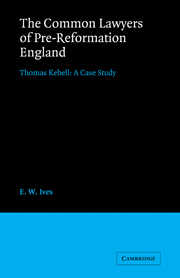Book contents
- Frontmatter
- Contents
- List of figures and tables
- Preface
- Abbreviations
- Manuscript sources
- Table of cases
- Introduction
- PART I THE LEGAL PROFESSION
- PART II LEGAL PRACTICE
- 5 The foundations of a legal practice
- 6 The lawyer and his clients
- 7 The lawyer and the year books
- 8 Thomas Kebell as an advocate
- PART III THE LAWYERS AND THE LAW
- PART IV THE PROFESSION AND SOCIETY
- Appendices
- Index
6 - The lawyer and his clients
Published online by Cambridge University Press: 05 November 2011
- Frontmatter
- Contents
- List of figures and tables
- Preface
- Abbreviations
- Manuscript sources
- Table of cases
- Introduction
- PART I THE LEGAL PROFESSION
- PART II LEGAL PRACTICE
- 5 The foundations of a legal practice
- 6 The lawyer and his clients
- 7 The lawyer and the year books
- 8 Thomas Kebell as an advocate
- PART III THE LAWYERS AND THE LAW
- PART IV THE PROFESSION AND SOCIETY
- Appendices
- Index
Summary
The primacy of local allegiance was one of the enduring features of English life before the Industrial Revolution. Provincial feeling served to rally the population in days before the nation meant a great deal outside the governing circles, and it also was associated with the simple matter of bread and butter. Until the Reformation, openings for service in a monastic administration were as important to the sons of neighbouring gentry as was the promise of what Milton called ‘convenient stowage‘ in the nearest nunnery to their ‘withered’ daughters. Amongst lawyers, just as local connections often determined the inn a man entered, so local connections played a significant part in bringing the work that he needed.
The most famous family of lawyers to exploit local connection were the Pastons. Judge Paston founded his success on his Norfolk clients while John Paston made a killing from the estates of his deceased employer and distant relative, John Fastolf of Caister. Nor was this only a one-way traffic. A lawyer with local knowledge and connections was a powerful and dangerous man, an ally well worth the gaining. The legal clans of Heydon, Jenney and Yelverton were substantially responsible for the prolonged tribulations of the Paston family, and not until they had been mollified by bribery or marriage alliances was Paston wealth secure. Something of the threat a lawyer might pose comes out in a king's bench case in which Kebell appeared, dated 1493.
- Type
- Chapter
- Information
- The Common Lawyers of Pre-Reformation EnglandThomas Kebell: A Case Study, pp. 115 - 146Publisher: Cambridge University PressPrint publication year: 1983

